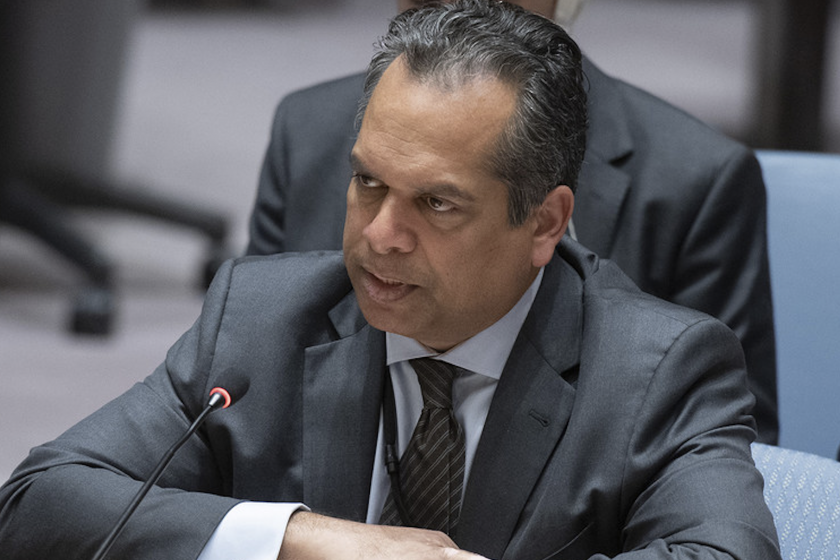Chris Sidoti speaks to Myanmar Now
During a top UNOCHA official’s trip to Myanmar, the military council’s health minister reportedly refused to facilitate conditions for greater Covid-19-related aid distribution
The military council’s health minister reportedly “rebuffed” a top UN official’s request for expanded humanitarian access for the delivery of Covid-19 assistance during his three-day visit to Myanmar earlier this week, according to a source within the UN.
Ramesh Rajasingham, Acting Assistant Secretary-General for Humanitarian Affairs and Deputy Emergency Relief Coordinator at the UN Office for the Coordination of Humanitarian Affairs (OCHA), visited Myanmar from Monday through Wednesday. On the first day of the trip, he met with three junta ministers for health, foreign affairs and social welfare, the UN source told Myanmar Now on the condition of anonymity.
The visit was made at the request of UN Secretary-General António Guterres, the source said, but neither side has made this information public and Myanmar Now was unable to verify the claim.
During Mr Rajasingham’s visit, he reportedly demanded that “certain conditions” be met for greater Covid-19-related humanitarian access but his request was “rebuffed” by junta health minister Thet Khine Win.
Myanmar has been in turmoil since February 1, when the military seized power from the civilian government led by State Counsellor Aung San Suu Kyi, who is currently detained in junta custody.
According to the Assistance Association for Political Prisoners, at least 1,105 people have been killed by the junta since the coup. Thousands more people have died amid the political instability and the surge of Covid-19 cases that subsequently hit the country. Tens of thousands of civilians have also been displaced by military raids and offensives carried out in an attempt to crush armed resistance to junta rule.
Since the coup, Myanmar’s public healthcare system has collapsed, with medical staff refusing to work in the junta’s hospitals and clinics and forced into hiding by the military’s protracted crackdown on striking workers.
Between June and August, when the third wave of the Covid-19 pandemic hit the country, the junta’s health ministry logged over 12,000 deaths—a fatality rate of nearly 5 percent—with 26 percent of those tested reported as positive for the coronavirus.
Civil society organisations and health experts have warned that these rates may have been even higher, but due to the difficulty of collecting data under the coup regime, other reported figures remain unavailable.
Questions have also been raised regarding the accuracy of the civilian administration’s pandemic figures collected prior to the military’s seizure of power in February. Under the National League for Democracy government, the infection rate was reported as 6.7 percent from March until December 2020, with 2,682 deaths attributed to Covid-19—a fatality rate of 2 percent.
The junta’s vaccination rollout plan has also been grossly insufficient in meeting the national need and has been widely boycotted by the majority of the public, who have expressed a lack of trust in the military to deliver authentic and safe vaccines.
Junta health minister Thet Khine Win reportedly rejected Mr Rajasingham’s requests for expanded aid access amid the pandemic, saying everything was “under control,” according to the UN source.
The source added that Mr Rajasingham also plans to meet with the shadow National Unity Government (NUG) and ASEAN, but did not elaborate further.
Members of the NUG were not immediately available for comment on Friday regarding the purported meeting with the OCHA official.
Another diplomatic source said that Mr Rajasingham also met with representatives from the UN country team, individual UN agencies, diplomatic missions and international non-governmental organisations either in person or online during his visit.
Valijon Ranoev, head of the reporting and public information unit at OCHA Myanmar, confirmed that those meetings took place.
He said that the objective of the trip was “to depoliticise Covid response as well as humanitarian responses” in the country and to establish access to the communities to which the UN aims to provide assistance.
The spokesperson refused to comment on any potential meetings with the NUG or ASEAN but said that the UN is willing to engage with “anyone necessary” to ensure safe access to all communities in need, including for the support of Covid-19 prevention and vaccinations.
Chris Sidoti, a former member of the UN Fact-Finding Mission on Myanmar and one of three members of the Special Advisory Council for Myanmar, told Myanmar Now that the UN’s attempt to respond to Myanmar’s humanitarian emergency was “good,” but warned against delivering aid through the junta.
“[A]ny humanitarian relief through the junta is likely to be affected by corruption, that is, siphoned off by military personnel, and weaponised as part of the struggle against the people of Myanmar,” Mr Sidoti told Myanmar Now.
He added that while the UN and the international community should act “with urgency” to provide emergency relief to the people of Myanmar, the “only effective way” to do so would be by working with the NUG, ethnic organisations, members of the Civil Disobedience Movement, General Strike Committees, and other civil society organisations supported by the Myanmar public.
Christine Schraner Burgener, the UN Secretary-General’s Special Envoy on Myanmar, was not present at the UN official’s meeting with the junta ministers, but stated on her official Twitter account on Tuesday that her “consultations for an all-inclusive dialogue in the interest of the people were not welcomed by the military.”
“I regret this clear lack of will for a peaceful solution which could have prevented other stakeholders from feeling they have no choice but to seek violent means,” she wrote on Twitter.


